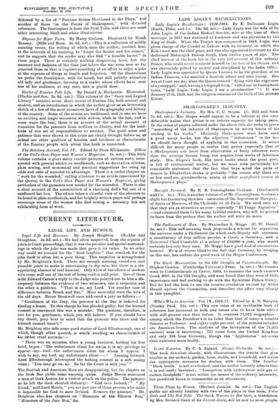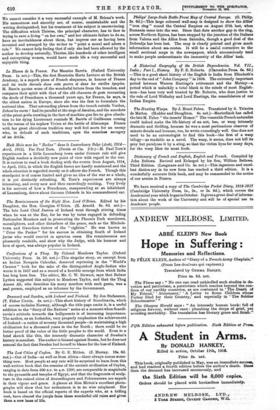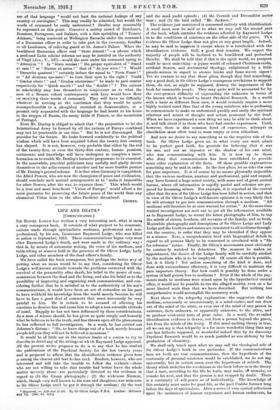SHAKESPEARE'S INDUSTRY.
Shakespeare's Industry. By Mrs. C. C. Stopes. (G. Bell and Sons. 7s. 6d. net.)—Mrs. Stopea would appear to be a believer in the very debatable axiom that genius is an infinite capacity for taking pane. In the series of papers collected under the above title she seeks to prove "something of the industry of Shakespeare by noting traces of his reading in his works." Obviously Shakespeare must have road a good many books, but the adjective " industrious " is the last we should have thought of applying in this connexion. It seents difficult for many people to realize that genius (especially that of a Shakespeare) can learn from observation or hasty reference more than the average human being can acquire from weeks of laborious study. Mrs. Stopes's book, like most books about the great poet, is full of controversial matter, but we must note particularly her remarkable statement that the fact that boys acted the parts of women in Elizabethan drama is probably "the reason why there are so few mothers, grandmothers, aunts, or other superfluous women in Shakespeare's playa."
Brought Forward. By R. B. Cunninghame Graham. (Duckworth and Co. 6s.)—This is another volume of of Mr. Cunninghamo Graham's slight but fascinating sketches—memories of the Argentine or Paraguay, of Spain or Morocco, of the Clydesido or of Paris. We need only say that they are as attractive as ever— especially "El Tango Argentin° " —and commend them to his many faithful readers, who will ho grieved to learn from the preface that the author will write no more.
The Parliament of Man. By Maximilian A. Mligge. (C. W. Daniel. 6s. net.)—This well-meaning book propounds a scheme for organizing the universe under a Parliament (in whioh essh Deputy will represent a constituency of four million people), a Court, a Secretary, and a Terrestrial Chief Constable at a salary of £10,000 a year, who would certainly be a very busy man. Mr. Mugge has a good deal of unconscious humour. He is of course blind to the fact that Germany, by bringing on this wai, has undone the good work of the Hague Conferences.
The Greek Manuscripts in the Old Seraglio at Constantinople. By Stephen Gaselee. (Cambridge University Press. ls. net.)—Mr.Gaselee went to Constantinople at Easter, 1909, to examine the much-vaunted Greek MSS. in the Old Seraglio, and soon found that they were of little importance and had nothing to do with the Byzantine Palace library. But ho had the luck to see the counter-revolution excited by Abdul Hamid against the Committee, and de:mile:a tho affair very clearly in this pamphlet.
Who's Who in America. Vol. IX., 1916-17. Edited by A. N. Marquis. (Stanley Paul. 21s. net.)—This new issue of an invaluable book of reference has increased in bulk and seems also to have been edited with still greater care than before. It contains 21,922 biographies— among which the President's is no fuller than that of many a humble Senator or Professor—and eighty-eight per cent. of the persons included are American-born. The analysis of the birthplaces of the 21,922 eminent ones is interesting ; 722 come from the United Kingdom and only 388 from Germany, though the " hyphenates " advertise their existence more loudly.
Insect Enemies. By C. A. Ealand. (Grant Richards. 6a. not.)— This book describes clearly, with illustrations, the insects that give trouble in the orchard, garden, farm, stable, and household, and states the appropriate measures for dealing with them. The familiar "black beetle" is not overlooked, and the author honestly admits that it is not easily banished ; "fumigation with hydrocyanic acid gas or carbon bisulphide " is not within the moans of the ordinary housewife, but powdered borax is commended as an alternative.
Three Plays by Brieuz. (Herbert Jenkins. 5s. net.)—The English public are already familiar with two of the plays in this book, False Gods and The Red Robe. The third, Woman on Her Own, a translation by Mrs. Bernard Shaw of La Femme Smite, will be new to most people.
We cannot consider it a very successful example of M. Brieux's work. His earnestness and sincerity are, of course, unmistakable and the writing distinguished, but his treatment of his subject is unconvincing. The difficulties which Therese, the principal character, has to face in trying to earn a living "on her own," and her ultimate failure to do so, have no inevitableness about them, but impress one as having been invented and arranged by the writer to "point a moral and adorn a tale." We cannot help feeling that if only she had been allowed by tho author to develop naturally, Therese, like hundreds of other intelligent and enterprising women, would have made life a very successful and enjoyable thing.
Le Blast= de la France. Par Maurice Barre,. (Oxford University Press, ls. net.)—This, the first Henriette Hertz Lecture at the British Academy, is a superb piece of French eloquence, in honour of France and its traits iternels dans tette guerre et dans lea vieilles ipopees. M. Barres quotes some of the wonderful letters from the trenches, and compares their spirit with that of the old chansons de geste recounting the deeds of Frenchmen a thousand years ago, for France, he says, is the oldest nation in Europe, since she was the first to formulate the national idea. That astounding phrase from the trench outside Verdun, Debout lea martsI had its parallel at the siege of Ascalon, and the anecdote of the priest-poilu crawling in the face of machine-gun fire to give absolution to his dying Lieutenant reminds AL Barrett of Guillaume coming to tho rescue of his nephew Vivien at the battle of .Aliscamps. France with her great chivalrous tradition may well feel scorn for an enemy who, in default of such traditions, apes tho senseless savagery of an Attila.
Huit Mois aver lea " Boches" dons le Luxembourg Belge (Awn, 1914— Avril, 1915). Par Paul Torn. (Perrin ot Cie. 3 fr.)—M. Paul Tom's experiences in a little Luxemburg town under German rule will give English readers a decidedly now point of view with regard to the war. It is curious to road a book dealing with tho events from August, 1914, to April, 1913, in which the English forces aro hardly mentioned and the whole situation is regarded merely as it affects the French. Though this standpoint is of course limited and gives no idea of the war as a whole, it is yet distinctly refreshing. M. Tom's experiences are always interesting, and every now and then exceedingly exciting. Very lively is his account of how a Frenchman, masquerading as an inhabitant of Luxemburg, drove about German Colonels in his commandeered car.
The Reminiscences of the Right lion. Lord O'Brien. Edited by his Daughter, the Hon. Georgina O'Brien. (E. Arnold. 8s. 6d. net.)— The late Lord Chief Justice of Ireland went through stirring times when he was at the Bar, for he was by turns engaged in defending Nationalist Members and in prosecuting the Phoenix Park murderers, moonlighters, and other disturbers of the peace, such as the Mitehelstown and Gweedore rioters of the "eighties." He was known as " Peter the Packer" for his success in obtaining South of Ireland juries who would convict in agrarian cases. His reminiscences are pleasantly readable, and show why the Judge, with his humour and love of sport, was always popular in Ireland.
Confessions of a Thug. By Colonel Meadows Taylor. (Oxford University Pross. ls. 3d. net.)—This singular story, an excerpt from an Indian Nowgate Calendar, deserved reprinting in the "World's Classics" both for the sake of tho distinguished Anglo-Indian who wrote it in 1837 and as a record of a horrible scourge from which India has long been free. The editor, Mr. C. W. Stewart, says that Bulwer Lytton suggested this subject to Meadows Taylor, and that the Thug Amcor Ali, who describes his many murders with such gusto, was a real person, employed as an informer by the Government.
Denmark and Sweden, with Iceland and Finland. By Jon Stefaneson. (T. Fisher Unwin. 5s. net.)—This short history of Scandinavia, which of course includes Norway, although the title-page omits it, is a useful addition to the "Story of tho Nations" series at a moment when Scandinavia's attitude towards the belligerents is of increasing importance. The author, as an Icelander, very properly emphasizes the achievement of Iceland—a nation of seventy thousand people—in maintaining a high civilization for a thousand years in the far North ; there could be no better proof of tho value of the little peoples to the world. Even in a brief sketch like this, the intensely dramatic character of Sweden's history is manifest. The author is biassed against Russia, but ho does not conceal the fact that Sweden had herself to blame for the loss of Finland.
The Lost Cities of Ceylon. By G. E. hiitton. (J. Murray. 10s. 6d. not.)—Out of India—as well as from Africa—there always comes something now. Most people at any rate will be surprised to learn from this well-written book that the remains of the ancient civilization of Ceylon, ranging in date from 500 D.C. to A.D. 1200, are comparable in magnitude to the pyramids and temples of Egypt, and that the fragments of seulp. tare in the ruined cities of Anuradhapura and Polonnaruwa are superb in their vigour and grace. A glance at Miss Mitten's excellent photographs will show that her enthusiasm is in no wise misplaced. Her book is based on the official reports of the experts who, at a trifling cost, have cleared the jungle from these wonderful old ruins and given them a new lease of life. Philips' Large-Scale Battle-Front Map of Central Europe. (G. Philip. 2s. 6d.)—This largo coloured wall-map is designed to show the Allies' "iron ring" round the Central Empires on August 27th last, when Rumania came into the war. Since that date another gap in the ring, across Northern Epirus, has been stopped by the junction of the Italians from Valona and tho Allies from Salonika, though a good deal of the Dobrudja has boon lost. The map is clearly printed and gives much information about sea-routes. It will be a useful corrective to the small sectional maps in the newspapers, which unconsciously tend to make people underestimate the immensity of the Allies' task.
A Historical Geography of the British Dependencies. Vol. VII., India ; Part I., History. By P. E. Roberts. (Clarendon Press. 6s. 6d.) —This is a good short history of the English in India from Elizabeth's day to the end of "John Company " in 1858. The extremely important period between Warren Hastings's retirement and the Mutiny—a period which is unluckily a total blank in the minds of most Englishmen—has been very well treated by Mr. Roberts, who does justice to the rule of Lord Wellesley and Lord Hastings, the consolidators of our Indian Empire.
The Hunting Wasps. By J. Henri Fabre. Translated by A. Teixeira de Mattes. (Hodder and Stoughton. 6s. net.)—Maoterlinck has called the late hi. Fabre "the insects' Homer." The venerable French naturalist could indeed make the life-history of an ant, bee, or wasp intensely dramatic and thrilling, because he was a most pertinacious observer of minute details and because, too, he wrote exceedingly well. One does not need to be an entomologist to find this book—the first of a wasp trilogy—as readable as a novel. The wasp, it seems, does not kill its prey but paralyses it by a sting, so that the victim lives for many days, for the wasp likes its meat fresh.
Dictionary of French and English, English and French. Compiled by John Bellows. Revised and Enlarged by his Son, William Bellows, Third Edition. (Longmans and Co. 5s. not.)—This ingenious and excellent diction ary in its new form has reached a third edition. It is a wonderfully accurate little book, and may be commended to the notice of our armies in France.
We have received a copy of The Cambridge Pocket Diary, 1916-1917 (Cambridge University Press, la., 2s., or 2s. 8d.), which covers the Academical year which began in October. It gives a great deal of information about the work of the University and will be of special use to Academic people. use of that language "would not hurt the national feelings of any country or contingent." This may readily be admitted, but would the words of command be easily understood 1 Doubts may reasonably be expressed on this point. Conceive a motley crowd of Dutchmen, Russians, Portuguese, and Italians, with a thin sprinkling of "Tommy Atldnses," being mustered at Wellington Barracks under the command of a Rumanian officer in order to take part in the ceremony, familiar to all Londoners, of relieving guard at St. James's Palace. When the bewildered Rumanian officer said "State intend ! "—a phrase which a profound Latin scholar informs me may be justified on the authority of Virgil (Aen., V., 137)—would the_men under his command spring to " Attention " ? Is "State remisai ! " the proper equivalent of "Stand at ease !" or " Barons .ut antes ! " that of "As you were ! " ? Would " Decurrite quaterni !" certainly induce the squad to "Form Fours !" or "Ad dextram spectate ! " to turn their eyes to the right ? Could " Gradus Mato ! " and "Grades eitatissimo !" be made to pass muster respectively for "Quick march !" and the " double 1 " ? The curious in scholarship may lose themselves in conjectures as to what the men of a Roman cohort contemporary with Livy would have dbne on receivirg these words of command. They will have no difficulty whatever in arriving at the conclusion that they would be quite incomprehensible to a ploughboy recruited in Somersotshire, or a peasant only acquainted with the language he had learnt at his home in the steppes of Russia, the sunny fields of France, or the mountains of Portugal.
• Even Mr. Dunlop is obliged to admit that "the proposition to let the International Army be formed by all the nations of Europe combined may not be practicable in our time." But he is not discouraged. He provides for the future. He looks forward confidently to the political wisdom which will have been acquired before the twenty-first century has elapsed. It is not, however, very probable that either by the end of the twenty-first, or even the thirty-first century, human passions, sentiments, and knowledge will have undergone so complete a transformation as to enable Mr. Dunlop's fantastic programme to ho executed. In the meanwhile, practical politicians may usefully and gladly devote themselves to the achievement of another and far more feasible portion of Mr. Dunlop's general scheme. It is that when Germany is vanquished, the Allied Powers, who are now the champions of peace and civilization, should conclude such mutual arrangements as to "make it impossible for other Powers, after the war, to separate them." This, which would be a true and most beneficent "Union of Europe," would afford a far surer guarantee for preserving the future peace of the world than any chimerical Union born in the ultra-Pacificist dreamland.
Caomna.














































 Previous page
Previous page